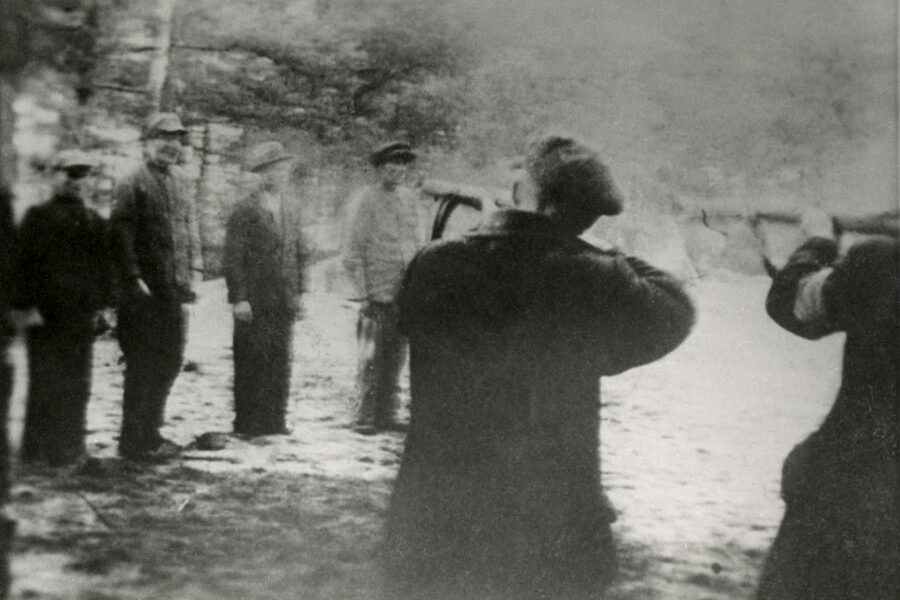From Poland’s ombudsman to Donald Tusk’s justice minister: The downfall of Adam Bodnar

Praised by the European Commission and the U.S. Embassy for allegedly restoring the rule of law, Adam Bodnar will leave the Justice Ministry forever associated with the modus operandi of the early days of Donald Tusk’s new government. A modus operandi in the style of political gangsterism, imposed by this former president of the European Council who is supported by Brussels.
Łukasz Warzecha
Donald Tusk’s shrewdness has helped him win more than one political battle. One of his typical ploys has always been to choose other people to handle the dirty work, while he himself could remain somewhat on the sidelines so as not to tarnish his image and avoid the possible legal consequences of the most questionable actions. In addition, Tusk knows how to select people for these roles who seem to derive genuine joy from their actions and perform the tasks entrusted to them with the zeal of party stooges.
In the current government, after a month in office, Justice Minister Adam Bodnar stands out in this regard, surpassing even Culture Minister Bartłomiej Sienkiewicz [who was entrusted by Tusk with the forceful, unlawful takeover of the public media and the country’s cultural institutions, ed.].
Here I must confess my own assessment of Adam Bodnar several years ago was mistaken.
Adam Bodnar’s CV leaves no doubt about his ideological profile. Back in the 1990s, that is, in his student days (he was born in 1977), he became active in the Never Again! (Nigdy Więcej!) association.
This leftist NGO, founded by Marcin Kornak (who died in 2014) and now headed by Rafał Pankowski, has been engaged in tracking down “fascism.” It recently became widely known for its denunciation of soccer referee Szymon Marciniak in connection with the latter’s participation in a non-political business event in the presence of Sławomir Mentzen [who is a leader of Konfedaracja, an alliance of nationalist and libertarian parties, ed.].
As Poles are aware, the referee ultimately bowed to those professional anti-fascists and can thus continue to conduct lucrative international meetings, although it is unclear whether he can still look at himself in the mirror.
Never Again! has been operating for years with the same logic: In order to maintain its position and to rake in grants and secure cooperation with organizations such as the Polish Football Association, it has to keep making noise over alleged cases of “fascism.” It therefore publishes reports in which it takes events and incidents without any ideological background and attributes them to racist or xenophobic motives.
Never Again! can be said to be the cradle of Adam Bodnar.
I was fooled
The current justice minister began his more widely known public activities at the Helsinki Foundation for Human Rights, and even became vice-chair of its Polish branch in the years 2010–2015. His activities there left no doubt about his ideological profile.
Hence my reaction when, just before the 2015 parliamentary elections, the outgoing majority elected Adam Bodnar as Poland’s ombudsman. At the time, I wrote an article about it for the Wirtualna Polska (wp.pl) website with the title: “Adam Bodnar, a leftist as Ombudsman.”
Here is what I wrote then at the beginning of that article:
“Imagine that the Right is in power in Poland, and that it is likely to lose the election to the left-liberal Civic Platform (PO). At the end of the term, the election of a new Ombudsman falls just in time. The right puts forward a candidate, Mr. Ygrekowski, a 40-year-old lawyer and until recently an activist of the radical nationalist Falanga organization. Mr. Ygrekowski presents himself before deputies who want to know his views, and he tells them: ‘Yes, I actually believe that the Polish misfortunes are to be blamed on the Jews. Yes, I am of the opinion that they should be expelled from Poland. I am also in favor of key offices being reserved exclusively for Catholics and of reserving some Senate seats for members of the Episcopate. Today, however, the Polish constitution does not give the possibility to enforce such solutions, and I accept this. I can assure you that I will keep my private views for myself and will not let them interfere with my role as Ombudsman. I will not try to push them through while in office, and I will only uphold the existing law […].’
In fact, we now have a very similar situation, except that it’s the other way around. Adam Bodnar’s radical leftist views are a mirror image of radical nationalist views. He is in favor of promoting sexual minorities and allowing them to adopt children, as well as in favor of all other typically leftist demands. Is this a problem? Not at all. Bodnar has won the job with the votes of the left, which is understandable, and with the votes of most PO deputies. Only a few of them could afford, as a gesture of protest, to vote against both candidates: Bodnar and his rival Zofia Romaszewska.”
Following my comments warning against his appointment as ombudsman, Bodnar expressed outrage on TVN24, pointing out that, under his leadership, the Helsinki Foundation for Human Rights had dealt with various cases, including that of Piotr Staruchowicz, a Legia Warsaw soccer fan held in “temporary” detention for several years.
This was true, but the Helsinki Foundation for Human Rights has its own dynamics, which does not allow it to be managed like a person’s private kingdom, and besides, it is a non-governmental organization. It is one thing to head one such organization, and quite another to fill a one-person office that is so important in the institutional arrangement of the Polish state.
Anyway, when Adam Bodnar was serving as ombudsman, I softened my assessment.
There was indeed plenty to criticize him for. One of his most outrageous statements was one he made on the public news channel TVP Info. Its was after a speech by then-Prime Minister Beata Szydło at the Auschwitz death camp on the occasion of the National Day of Remembrance for Victims of German Nazi Concentration Camps in June 2017. At the time, the Prime Minister said that “Auschwitz is a lesson that everything must be done to protect our citizens.”
The German newspaper Frankfurter Rundschau criticized her because it considered it a historical policy aimed at “blaming the Holocaust on the Germans.” No kidding! Bodnar commented on this on state television (at the time, TVP Info still invited such people), saying: “There is no doubt that the Germans were responsible for the Holocaust. […] we must remember that many nations were complicit in its implementation. Including, I say it with regret, the Polish nation.”
I asked him about this statement shortly after in an interview with Do Rzeczy. Bodnar then explained: “The word ‘nation’ I used was too large a quantifier and indeed an inappropriate one. However, it was clear from the conversation that I was referring to individuals, Polish citizens who also had a part in making the Holocaust possible. Even if they were relatively few in number.”
A Polish volunteer in Auschwitz: the only such case in history (interview)
I also asked him about the high-profile case of a Lodz printer who had refused to accept an order from an LGBT organization to print posters. Ombudsman Adam Bodnar then joined the case on the side of the entrepreneur’s would-be customers. I wanted to know how Adam Bodnar would have behaved if the National-Radical Camp (ONR) had been in the place of that LGBT organization.
Bodnar answered: “If there were no calls for racist actions or violence on the poster, but only – as in the case of the Lodz printer – the name of the organization, its address and logo, then yes, I would have behaved exactly the same way. The printer would have no right to refuse to sell his services. ONR is a legally operating organization.”
The activities of the ombudsman’s office and a certain degree of openness on Bodnar’s part to other views and circles led me to the conclusion that he was doing relatively well for a lawyer with unambiguously leftist views. Or rather: it wasn’t as bad as could have been expected from him. This is where I was fooled.
Shattered image
Only that the position of Poland’s ombudsman did not satisfy Adam Bodnar’s exuberant ambitions. These Donald Tusk appropriately recognized and decided to capitalize on.
When news broke that Adam Bodnar might head the Justice Ministry, one might have hoped that this meant a turnaround, of course, but done in a relatively conciliatory, calm style. A fairly widespread opinion of Bodnar – shaped largely by his six years as ombudsman – was that he is a person with clear-cut views, but one who is largely independent and moderate in his actions.
However, a month in office as minister for justice was enough to completely shatter this image, and I must admit to having been grossly mistaken about him. As it turns out, my original judgment from 2015 was the right one.
The symbol of Adam Bodnar’s ministerial action will forever remain his statement on Radio Zet about seeking some legal basis for actions that had already been taken. This is the confession of a political Bolshevik, based on the old communist scheme: “Give me the man and I will give you the case against him.”
The author of this famous phrase was the Soviet prosecutor Andrey Vyshinsky. In other words, first we act, and then we look for some legal tricks to have some kind of basis for our actions. Such conduct has nothing to do with restoring the rule of law.
In practice, Justice Minister Bodnar has been using the same method to get rid of his deputy, National Prosecutor Dariusz Barski, who was appointed by the previous government.
It is true that Bodnar’s situation as attorney general was difficult. The previous parliamentary majority amended the law on the prosecutor’s office in September 2023, so that the written consent of the president is now needed to remove the national prosecutor. At the same time, with the September amendment to the law, the hierarchy of Poland’s prosecution services is now structured in such a way that the national prosecutor has assumed many of the powers of the attorney general to manage the day-to-day work of prosecutors.
Even before the elections, there were opinions from lawyers sympathetic to the then-opposition about what the next justice minister could do about this situation. Among them were such ideas as having the justice minister, who in Poland is also the attorney general, prohibit the national prosecutor from taking any action.
Remarkably, however, among the different ideas expressed at the time, the solution Bodnar would ultimately opt for was nowhere to be found.
In other words, before Bodnar, based on a legal opinion established at his request by lawyers from his political camp, declared that National Prosecutor Dariusz Barski’s appointment by the previous government was invalid due to his allegedly illegal reinstatement from retirement, no-one had thought of such a possibility.
As a matter of fact, those who expressed their opinions before the elections did not foresee the kind of steamroller policy Adam Bodnar is conducting, leading to total chaos. Lawyers who are in favor of the current ruling coalition, on the other hand, spoke quite often about the need to find a compromise with the president to pass a new law on prosecutors. No compromise was sought, however.
The draft laws that were said to be ready have proved to be fairy tales. Minister Bodnar announced only in the second week of January the imminent presentation of principles for a new draft law on the prosecutor’s office. Such principles are not the same as a draft law. In the current situation, it is also difficult to imagine that they can in any way accommodate the demands of President Andrzej Duda and be the basis for a compromise on this issue.
Adam Bodnar then recalled 144 prosecutors at once from their current postings simply because they had been assigned there under his predecessor at the justice ministry. True, there were many objections to the way the prosecutor’s office was managed by the previous government, as well as to the course of specific proceedings. It is very possible that some of the prosecutors should have rightly been recalled.
Except that, for the sake of the public and the proceedings being conducted, this should have been done carefully, looking at each case separately, analyzing what kind of proceedings a given prosecutor was conducting, what his or her professional track record was, and whether there might be legitimate reproaches made against him or her.
This, of course, would have to take some time. Prime Minister Donald Tusk apparently had different expectations.
Total submission
So, for now, we have growing chaos in the prosecutor’s office, an open revolt by a sizable group of prosecutors against the new justice minister and attorney general, and the announcement by the national prosecutor that he does not intend to recall 144 prosecutors from their postings, since according to the national prosecutor’s office, the attorney general has no authority to issue such an order.
Offenders, including dangerous criminals, can only rejoice at this mess.
In the case of MPs Kamiński and Wąsik [who were arrested on January 9, ed.], in order to defend at least partially his own endangered position, President Andrzej Duda decided to use a pardon procedure that requires the cooperation of the Ministry of Justice (rather than repeat the “automatic” procedure he used against the two politicians the first time in 2015, in the same case).
President Duda then called on Justice Minister Bodnar to suspend the enforcement of the two men’s prison sentence until the procedure was completed. The response from Minister Bodnar was chilly, to say the least.
True, there is an ongoing struggle between the government and the president, but a decision to let both men out of prison would have eased the tension to some extent. However, it appears that Bodnar decided to follow the logic of tribal warfare rather than the logic of compromise.
What is striking about Adam Bodnar’s conduct is that he has readily agreed to do Donald Tusk’s dirty work. He really did not have to and there is no doubt Tusk will get rid of him without hesitation when needed.
As a lawyer, Adam Bodnar had a track record and an established position. He could have continued to consolidate his position as a senator and pursued his ambitions in the future perhaps more slowly, but without such huge damage to his image, and without getting bogged down in this ugly partisan fight.
In fact, he will come out of the Ministry of Justice forever associated with the modus operandi of the early days of the new government, in the style of political gangsterism imposed by the prime minister.
This shows Adam Bodnar to be a completely submissive man, who accepts without batting an eye the methods dictated to him by more mature and astute politicians. A man so consumed by ambition that he seems unable to foresee the dire consequences of what is happening today, not only for the Polish state, but also for himself.
This article was first published in Polish in the Do Rzeczy weekly in January 2024.



